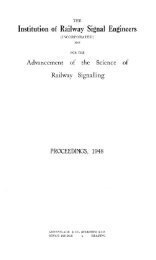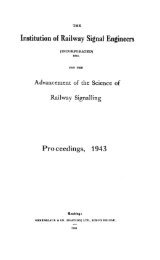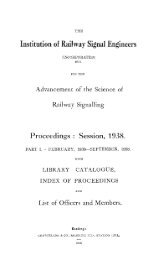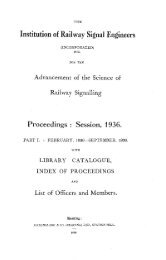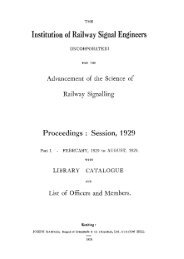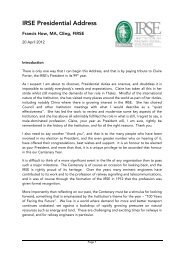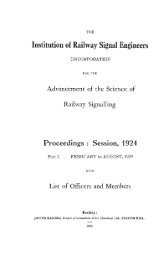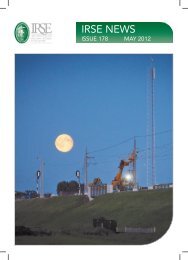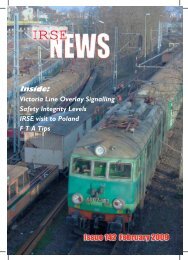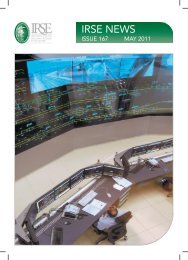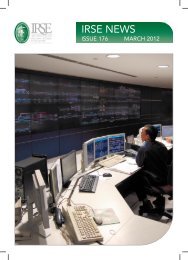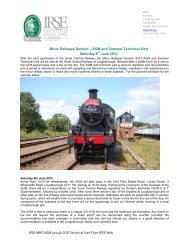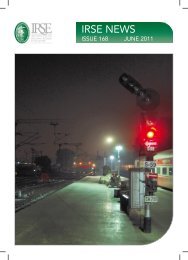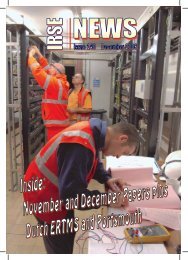IRSE Sept 08.indd
IRSE Sept 08.indd
IRSE Sept 08.indd
Create successful ePaper yourself
Turn your PDF publications into a flip-book with our unique Google optimized e-Paper software.
PERSONALITY PROFILE<br />
changing name on the brass plate at the Estover Close premises as<br />
one company gave way to another.<br />
Unfortunately Adtranz, during their brief reign, thought that<br />
Reading was a more appropriate place for the business<br />
development, engineering and sales staff resulting in Alan having to<br />
move back in 2001 to the town of his birth. Only to a small flat<br />
though. Home would remain in Devon.<br />
There, he worked with Trevor Lampen on business development<br />
and then with the Vice President on R&D for signalling systems<br />
worldwide. By now Bombardier was the owner and Alan was<br />
despatched to Thailand as Engineer for the Thai State Railways<br />
contract to resignal the main lines.<br />
In 1998, there was a diversion into the world of academia at<br />
Bath University to be Course Director for distance learning for signal<br />
engineering. Unfortunately, this good idea did not receive the<br />
support that it deserved.<br />
Today, he is Bombardier’s Engineer for the Gautrain project in<br />
South Africa. A new line is under construction between<br />
Johannesburg and Pretoria with a branch to the airport and has to<br />
be ready for the football world cup in 2010. It will be the first high<br />
speed line in Africa and will be standard gauge instead of Cape<br />
gauge.<br />
So what does he do when not travelling the world? Well, when<br />
relaxing, he can be heard for miles. He’s a tuba player with the<br />
local brass band. That’s another noisy President! We should be<br />
able to form an <strong>IRSE</strong> brass band by now. The entire Fisher family is<br />
musical with the score being boy, boy, girl and boy. Jennie and<br />
Alan’s second son plays with the Brighouse and Rastrick band in<br />
Yorkshire. You have to be good to be in that select group. Jennie is<br />
Chairman of the band. She also works in the Social Services<br />
department in the town.<br />
The other three live locally with the eldest son a carpenter and<br />
the youngest an animal carer at the Royal Duchy College. His<br />
daughter is a fitness instructor at the Tavistock gym where she<br />
keeps her father in good physical trim to deal with the rigours of his<br />
other main interest. He’s been a Special Constable, Inspector<br />
grade, since 1992 and having been a rugby player in his youth, the<br />
local football rowdies and hoodies keep their distance when<br />
Inspector Fisher is patrolling the town.<br />
Alan has been involved with the Institution since his British<br />
Railways days having served on many committees and presented<br />
technical papers. This year is an Aspect year and it is particularly<br />
appropriate that he should be in charge as it was his inspiration to<br />
give our highly regarded technical gathering this short but apt title.<br />
Project delivery is a matter about which he has strong views.<br />
He recalls his time as project engineer for the Berks and Hants line<br />
resignalling where he and his colleagues, none of whom were<br />
particularly senior in the industry, had considerable autonomy in the<br />
design, installation, testing and commissioning of the scheme.<br />
Nowadays, nothing can be progressed without the creation of a<br />
mountain of paper work that has to be submitted to a range of<br />
committees for scrutiny and, often as not, returned for modification.<br />
Bad enough when it is outside agencies over which you have little<br />
influence but much of it is self inflicted. Our over-cautious attitude<br />
to everything needs to be overcome.<br />
The <strong>IRSE</strong> enjoys an independent and influential position in the<br />
industry. It is the ideal forum to take the lead in the pursuit of a<br />
return to a common sense approach to our engineering<br />
responsibilities. If we can achieve this then perhaps the other<br />
bodies will follow.<br />
<strong>IRSE</strong><br />
Younger Members Workshop - The Simulator<br />
As part of an <strong>IRSE</strong> student day recently held at the Network Rail<br />
Watford Training Centre (see report on page 25), The Railway<br />
Engineering Company (TRE) showcased their Integrated<br />
Electronic Control Centre (IECC) style signalling simulator,<br />
TRESIM. The particular workstations that were chosen to<br />
demonstrate the functionality of the full fidelity simulator was<br />
Slough Paddington & Hayes which extend from Paddington<br />
Station to Stockley Bridge Junction.<br />
Due to the integration of commissioned data into the<br />
simulator it is capable of not only accurately displaying the<br />
signalling workstation but also the full behaviour and<br />
functionality of all the connected sub-systems such as Solid<br />
State Interlockings (SSI) and Automatic Route Setting (ARS).<br />
The simulators are an integral part of the training curriculum<br />
for signallers as they provide a safe, off-line ability to practise<br />
routine signalling tasks as well as emergency and disrupted<br />
service scenarios. The signaller is constantly observed and<br />
monitored during each session by an instructor who has the<br />
ability to dynamically change the scenario to include broken<br />
down locos, failed signalling objects, such as signals or points,<br />
and the effects of adverse railhead conditions.<br />
During the day, the simulator was used to introduce the<br />
concept of Visual Display Unit based signalling as well as the<br />
other possibilities for the simulator such as Timetable<br />
Verification, Scheme Plan Evaluation and Human Factors<br />
Studies. As the day progressed it also gave the students a visual<br />
insight into the more complicated signalling principles that were<br />
being discussed, such as, aspect sequencing of the Splitting<br />
Distant signal found near Heathrow Airport Junction on the<br />
Slough Hayes workstation.<br />
The simulator volunteered by TRE was warmly received by all<br />
involved and particularly by the students involved who appear to<br />
benefit greatly from the ability to visualize the theory that they<br />
had been studying.<br />
<strong>IRSE</strong><br />
NEWS Issue 137 <strong>Sept</strong>ember 2008 15



